After Action Review Report on the Ozzipalooza Simulation Event
VerifiedAdded on 2022/09/12
|6
|1862
|11
Report
AI Summary
This report presents an after-action review of the Ozzipalooza simulation, a text-based management game where the student, in the role of Alex, had to organize a music event. The report summarizes the event, highlighting decisions related to planning, organizing, leading, and controlling, and discusses the performance outcomes, including financial losses and strengths in teamwork. It evaluates the student's learning experience, reflecting on what worked well and what could have been improved, particularly in the context of applying management concepts studied in the course. The analysis identifies the importance of balancing task-oriented and relationship-oriented approaches, and the integrated nature of management functions. The report concludes with lessons learned, such as the importance of controlling tools and judgment calls in leadership, and suggests areas for improvement in future simulations. The student reflects on the integration of management functions and the impact of decision-making on the overall success of the event. The simulation provided insights into the practical application of management theories.
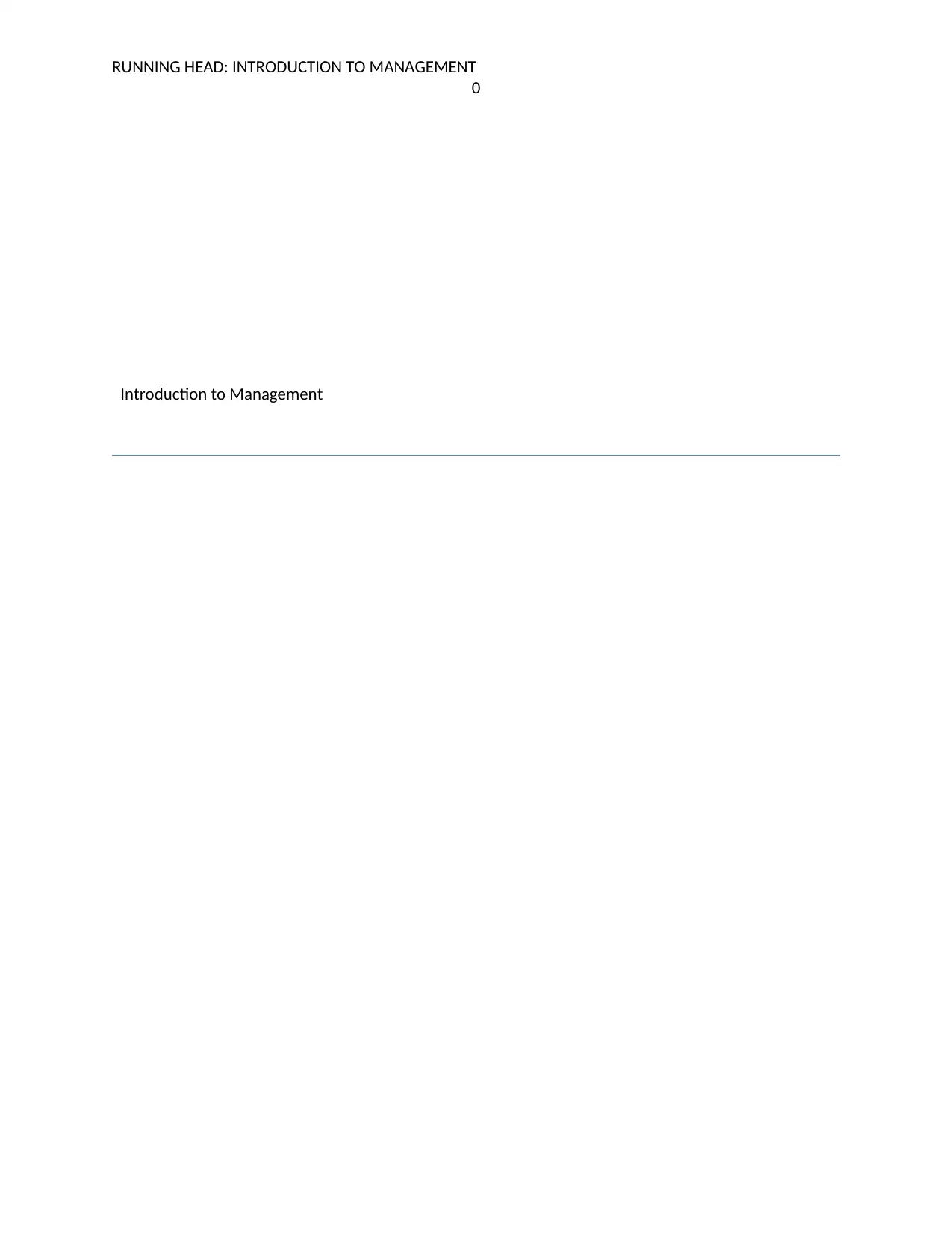
RUNNING HEAD: INTRODUCTION TO MANAGEMENT
0
Introduction to Management
0
Introduction to Management
Paraphrase This Document
Need a fresh take? Get an instant paraphrase of this document with our AI Paraphraser
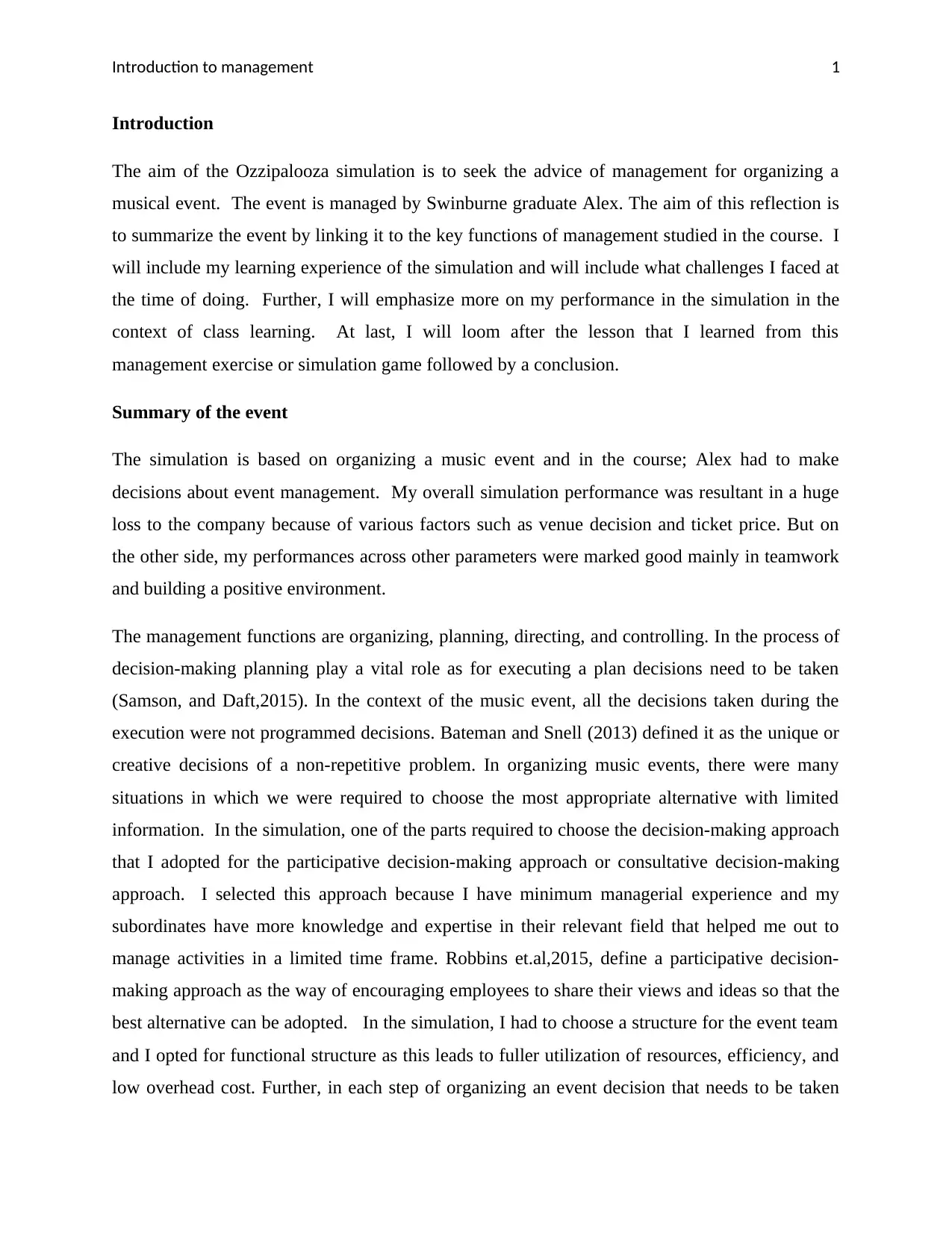
Introduction to management 1
Introduction
The aim of the Ozzipalooza simulation is to seek the advice of management for organizing a
musical event. The event is managed by Swinburne graduate Alex. The aim of this reflection is
to summarize the event by linking it to the key functions of management studied in the course. I
will include my learning experience of the simulation and will include what challenges I faced at
the time of doing. Further, I will emphasize more on my performance in the simulation in the
context of class learning. At last, I will loom after the lesson that I learned from this
management exercise or simulation game followed by a conclusion.
Summary of the event
The simulation is based on organizing a music event and in the course; Alex had to make
decisions about event management. My overall simulation performance was resultant in a huge
loss to the company because of various factors such as venue decision and ticket price. But on
the other side, my performances across other parameters were marked good mainly in teamwork
and building a positive environment.
The management functions are organizing, planning, directing, and controlling. In the process of
decision-making planning play a vital role as for executing a plan decisions need to be taken
(Samson, and Daft,2015). In the context of the music event, all the decisions taken during the
execution were not programmed decisions. Bateman and Snell (2013) defined it as the unique or
creative decisions of a non-repetitive problem. In organizing music events, there were many
situations in which we were required to choose the most appropriate alternative with limited
information. In the simulation, one of the parts required to choose the decision-making approach
that I adopted for the participative decision-making approach or consultative decision-making
approach. I selected this approach because I have minimum managerial experience and my
subordinates have more knowledge and expertise in their relevant field that helped me out to
manage activities in a limited time frame. Robbins et.al,2015, define a participative decision-
making approach as the way of encouraging employees to share their views and ideas so that the
best alternative can be adopted. In the simulation, I had to choose a structure for the event team
and I opted for functional structure as this leads to fuller utilization of resources, efficiency, and
low overhead cost. Further, in each step of organizing an event decision that needs to be taken
Introduction
The aim of the Ozzipalooza simulation is to seek the advice of management for organizing a
musical event. The event is managed by Swinburne graduate Alex. The aim of this reflection is
to summarize the event by linking it to the key functions of management studied in the course. I
will include my learning experience of the simulation and will include what challenges I faced at
the time of doing. Further, I will emphasize more on my performance in the simulation in the
context of class learning. At last, I will loom after the lesson that I learned from this
management exercise or simulation game followed by a conclusion.
Summary of the event
The simulation is based on organizing a music event and in the course; Alex had to make
decisions about event management. My overall simulation performance was resultant in a huge
loss to the company because of various factors such as venue decision and ticket price. But on
the other side, my performances across other parameters were marked good mainly in teamwork
and building a positive environment.
The management functions are organizing, planning, directing, and controlling. In the process of
decision-making planning play a vital role as for executing a plan decisions need to be taken
(Samson, and Daft,2015). In the context of the music event, all the decisions taken during the
execution were not programmed decisions. Bateman and Snell (2013) defined it as the unique or
creative decisions of a non-repetitive problem. In organizing music events, there were many
situations in which we were required to choose the most appropriate alternative with limited
information. In the simulation, one of the parts required to choose the decision-making approach
that I adopted for the participative decision-making approach or consultative decision-making
approach. I selected this approach because I have minimum managerial experience and my
subordinates have more knowledge and expertise in their relevant field that helped me out to
manage activities in a limited time frame. Robbins et.al,2015, define a participative decision-
making approach as the way of encouraging employees to share their views and ideas so that the
best alternative can be adopted. In the simulation, I had to choose a structure for the event team
and I opted for functional structure as this leads to fuller utilization of resources, efficiency, and
low overhead cost. Further, in each step of organizing an event decision that needs to be taken
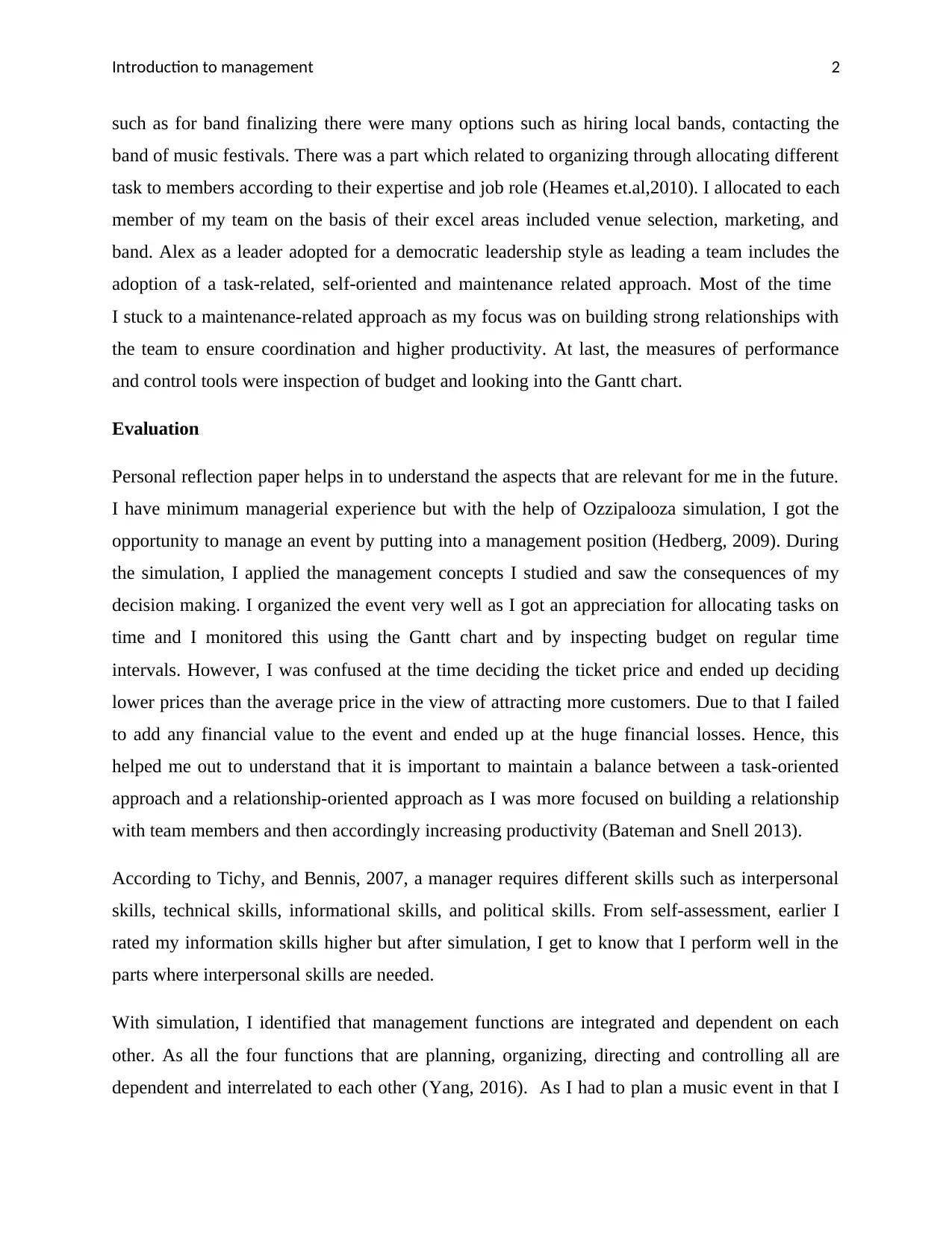
Introduction to management 2
such as for band finalizing there were many options such as hiring local bands, contacting the
band of music festivals. There was a part which related to organizing through allocating different
task to members according to their expertise and job role (Heames et.al,2010). I allocated to each
member of my team on the basis of their excel areas included venue selection, marketing, and
band. Alex as a leader adopted for a democratic leadership style as leading a team includes the
adoption of a task-related, self-oriented and maintenance related approach. Most of the time
I stuck to a maintenance-related approach as my focus was on building strong relationships with
the team to ensure coordination and higher productivity. At last, the measures of performance
and control tools were inspection of budget and looking into the Gantt chart.
Evaluation
Personal reflection paper helps in to understand the aspects that are relevant for me in the future.
I have minimum managerial experience but with the help of Ozzipalooza simulation, I got the
opportunity to manage an event by putting into a management position (Hedberg, 2009). During
the simulation, I applied the management concepts I studied and saw the consequences of my
decision making. I organized the event very well as I got an appreciation for allocating tasks on
time and I monitored this using the Gantt chart and by inspecting budget on regular time
intervals. However, I was confused at the time deciding the ticket price and ended up deciding
lower prices than the average price in the view of attracting more customers. Due to that I failed
to add any financial value to the event and ended up at the huge financial losses. Hence, this
helped me out to understand that it is important to maintain a balance between a task-oriented
approach and a relationship-oriented approach as I was more focused on building a relationship
with team members and then accordingly increasing productivity (Bateman and Snell 2013).
According to Tichy, and Bennis, 2007, a manager requires different skills such as interpersonal
skills, technical skills, informational skills, and political skills. From self-assessment, earlier I
rated my information skills higher but after simulation, I get to know that I perform well in the
parts where interpersonal skills are needed.
With simulation, I identified that management functions are integrated and dependent on each
other. As all the four functions that are planning, organizing, directing and controlling all are
dependent and interrelated to each other (Yang, 2016). As I had to plan a music event in that I
such as for band finalizing there were many options such as hiring local bands, contacting the
band of music festivals. There was a part which related to organizing through allocating different
task to members according to their expertise and job role (Heames et.al,2010). I allocated to each
member of my team on the basis of their excel areas included venue selection, marketing, and
band. Alex as a leader adopted for a democratic leadership style as leading a team includes the
adoption of a task-related, self-oriented and maintenance related approach. Most of the time
I stuck to a maintenance-related approach as my focus was on building strong relationships with
the team to ensure coordination and higher productivity. At last, the measures of performance
and control tools were inspection of budget and looking into the Gantt chart.
Evaluation
Personal reflection paper helps in to understand the aspects that are relevant for me in the future.
I have minimum managerial experience but with the help of Ozzipalooza simulation, I got the
opportunity to manage an event by putting into a management position (Hedberg, 2009). During
the simulation, I applied the management concepts I studied and saw the consequences of my
decision making. I organized the event very well as I got an appreciation for allocating tasks on
time and I monitored this using the Gantt chart and by inspecting budget on regular time
intervals. However, I was confused at the time deciding the ticket price and ended up deciding
lower prices than the average price in the view of attracting more customers. Due to that I failed
to add any financial value to the event and ended up at the huge financial losses. Hence, this
helped me out to understand that it is important to maintain a balance between a task-oriented
approach and a relationship-oriented approach as I was more focused on building a relationship
with team members and then accordingly increasing productivity (Bateman and Snell 2013).
According to Tichy, and Bennis, 2007, a manager requires different skills such as interpersonal
skills, technical skills, informational skills, and political skills. From self-assessment, earlier I
rated my information skills higher but after simulation, I get to know that I perform well in the
parts where interpersonal skills are needed.
With simulation, I identified that management functions are integrated and dependent on each
other. As all the four functions that are planning, organizing, directing and controlling all are
dependent and interrelated to each other (Yang, 2016). As I had to plan a music event in that I
⊘ This is a preview!⊘
Do you want full access?
Subscribe today to unlock all pages.

Trusted by 1+ million students worldwide
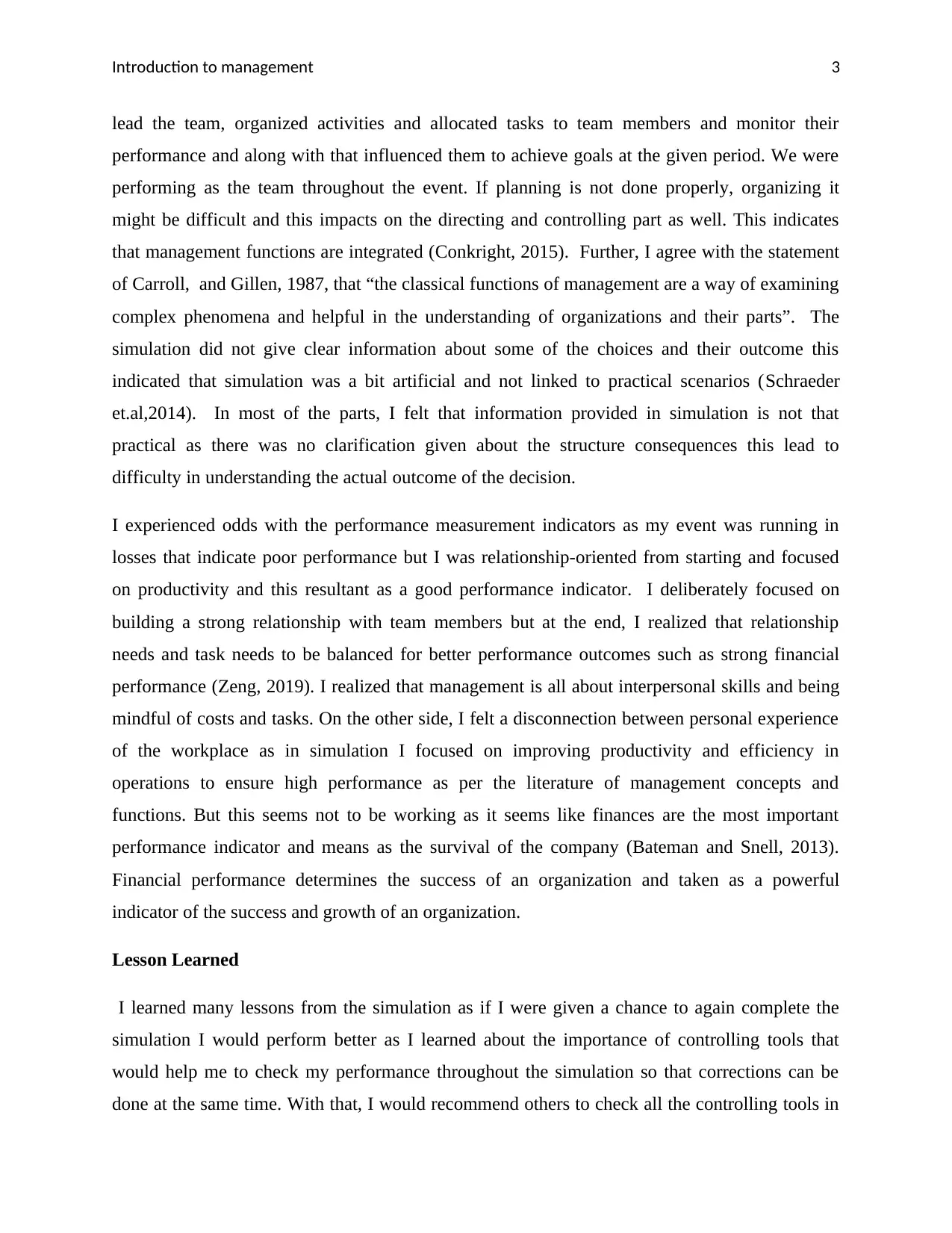
Introduction to management 3
lead the team, organized activities and allocated tasks to team members and monitor their
performance and along with that influenced them to achieve goals at the given period. We were
performing as the team throughout the event. If planning is not done properly, organizing it
might be difficult and this impacts on the directing and controlling part as well. This indicates
that management functions are integrated (Conkright, 2015). Further, I agree with the statement
of Carroll, and Gillen, 1987, that “the classical functions of management are a way of examining
complex phenomena and helpful in the understanding of organizations and their parts”. The
simulation did not give clear information about some of the choices and their outcome this
indicated that simulation was a bit artificial and not linked to practical scenarios (Schraeder
et.al,2014). In most of the parts, I felt that information provided in simulation is not that
practical as there was no clarification given about the structure consequences this lead to
difficulty in understanding the actual outcome of the decision.
I experienced odds with the performance measurement indicators as my event was running in
losses that indicate poor performance but I was relationship-oriented from starting and focused
on productivity and this resultant as a good performance indicator. I deliberately focused on
building a strong relationship with team members but at the end, I realized that relationship
needs and task needs to be balanced for better performance outcomes such as strong financial
performance (Zeng, 2019). I realized that management is all about interpersonal skills and being
mindful of costs and tasks. On the other side, I felt a disconnection between personal experience
of the workplace as in simulation I focused on improving productivity and efficiency in
operations to ensure high performance as per the literature of management concepts and
functions. But this seems not to be working as it seems like finances are the most important
performance indicator and means as the survival of the company (Bateman and Snell, 2013).
Financial performance determines the success of an organization and taken as a powerful
indicator of the success and growth of an organization.
Lesson Learned
I learned many lessons from the simulation as if I were given a chance to again complete the
simulation I would perform better as I learned about the importance of controlling tools that
would help me to check my performance throughout the simulation so that corrections can be
done at the same time. With that, I would recommend others to check all the controlling tools in
lead the team, organized activities and allocated tasks to team members and monitor their
performance and along with that influenced them to achieve goals at the given period. We were
performing as the team throughout the event. If planning is not done properly, organizing it
might be difficult and this impacts on the directing and controlling part as well. This indicates
that management functions are integrated (Conkright, 2015). Further, I agree with the statement
of Carroll, and Gillen, 1987, that “the classical functions of management are a way of examining
complex phenomena and helpful in the understanding of organizations and their parts”. The
simulation did not give clear information about some of the choices and their outcome this
indicated that simulation was a bit artificial and not linked to practical scenarios (Schraeder
et.al,2014). In most of the parts, I felt that information provided in simulation is not that
practical as there was no clarification given about the structure consequences this lead to
difficulty in understanding the actual outcome of the decision.
I experienced odds with the performance measurement indicators as my event was running in
losses that indicate poor performance but I was relationship-oriented from starting and focused
on productivity and this resultant as a good performance indicator. I deliberately focused on
building a strong relationship with team members but at the end, I realized that relationship
needs and task needs to be balanced for better performance outcomes such as strong financial
performance (Zeng, 2019). I realized that management is all about interpersonal skills and being
mindful of costs and tasks. On the other side, I felt a disconnection between personal experience
of the workplace as in simulation I focused on improving productivity and efficiency in
operations to ensure high performance as per the literature of management concepts and
functions. But this seems not to be working as it seems like finances are the most important
performance indicator and means as the survival of the company (Bateman and Snell, 2013).
Financial performance determines the success of an organization and taken as a powerful
indicator of the success and growth of an organization.
Lesson Learned
I learned many lessons from the simulation as if I were given a chance to again complete the
simulation I would perform better as I learned about the importance of controlling tools that
would help me to check my performance throughout the simulation so that corrections can be
done at the same time. With that, I would recommend others to check all the controlling tools in
Paraphrase This Document
Need a fresh take? Get an instant paraphrase of this document with our AI Paraphraser
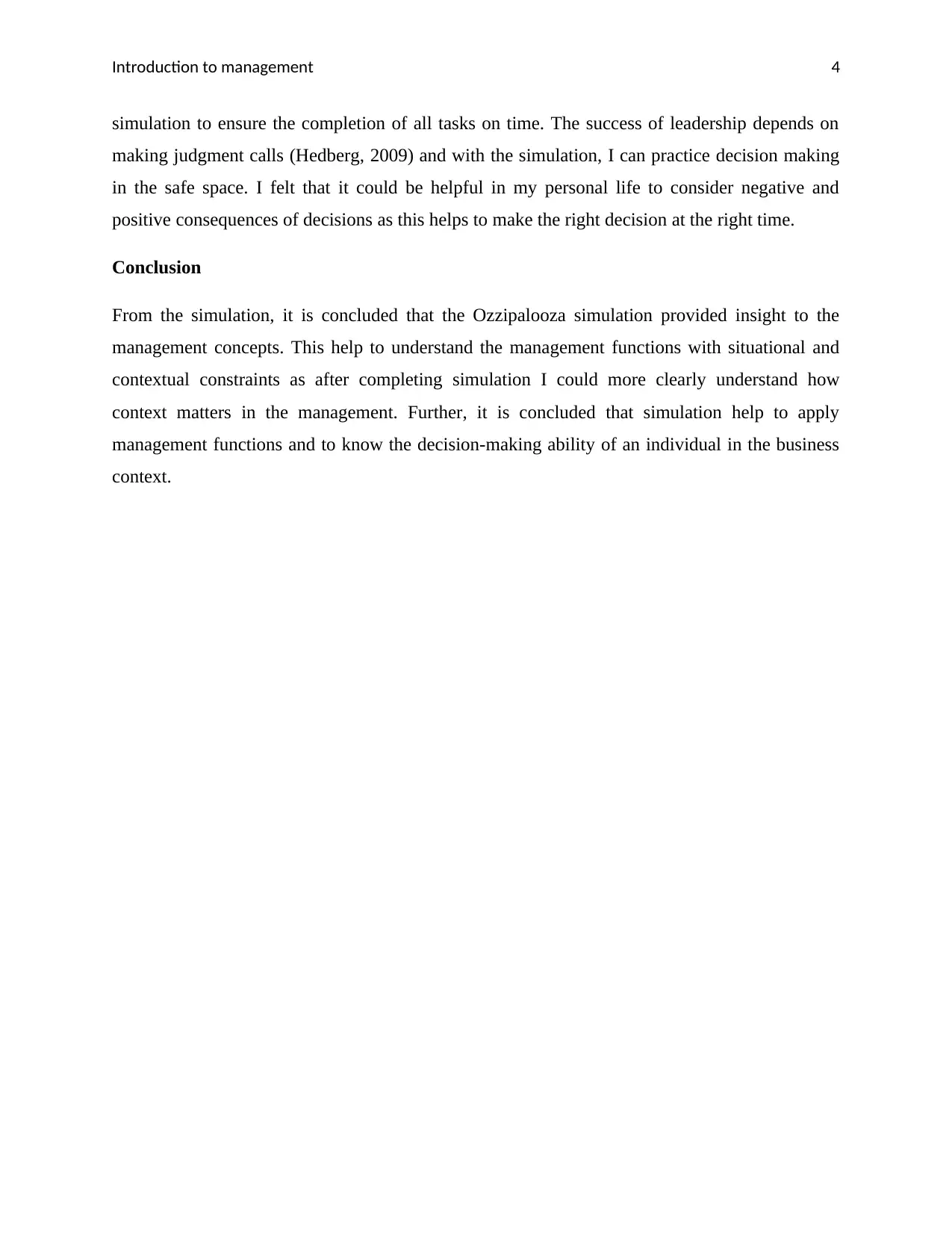
Introduction to management 4
simulation to ensure the completion of all tasks on time. The success of leadership depends on
making judgment calls (Hedberg, 2009) and with the simulation, I can practice decision making
in the safe space. I felt that it could be helpful in my personal life to consider negative and
positive consequences of decisions as this helps to make the right decision at the right time.
Conclusion
From the simulation, it is concluded that the Ozzipalooza simulation provided insight to the
management concepts. This help to understand the management functions with situational and
contextual constraints as after completing simulation I could more clearly understand how
context matters in the management. Further, it is concluded that simulation help to apply
management functions and to know the decision-making ability of an individual in the business
context.
simulation to ensure the completion of all tasks on time. The success of leadership depends on
making judgment calls (Hedberg, 2009) and with the simulation, I can practice decision making
in the safe space. I felt that it could be helpful in my personal life to consider negative and
positive consequences of decisions as this helps to make the right decision at the right time.
Conclusion
From the simulation, it is concluded that the Ozzipalooza simulation provided insight to the
management concepts. This help to understand the management functions with situational and
contextual constraints as after completing simulation I could more clearly understand how
context matters in the management. Further, it is concluded that simulation help to apply
management functions and to know the decision-making ability of an individual in the business
context.
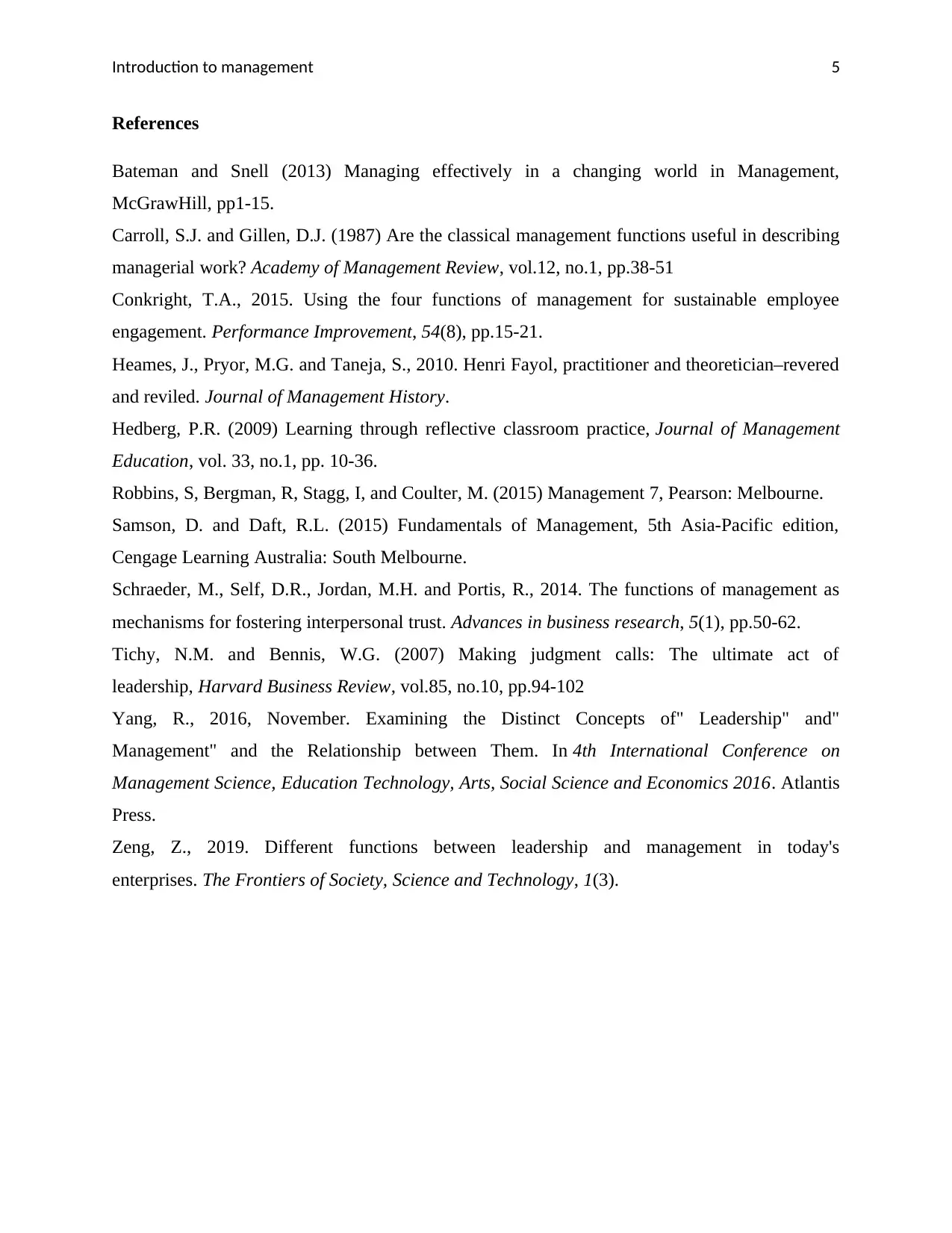
Introduction to management 5
References
Bateman and Snell (2013) Managing effectively in a changing world in Management,
McGrawHill, pp1-15.
Carroll, S.J. and Gillen, D.J. (1987) Are the classical management functions useful in describing
managerial work? Academy of Management Review, vol.12, no.1, pp.38-51
Conkright, T.A., 2015. Using the four functions of management for sustainable employee
engagement. Performance Improvement, 54(8), pp.15-21.
Heames, J., Pryor, M.G. and Taneja, S., 2010. Henri Fayol, practitioner and theoretician–revered
and reviled. Journal of Management History.
Hedberg, P.R. (2009) Learning through reflective classroom practice, Journal of Management
Education, vol. 33, no.1, pp. 10-36.
Robbins, S, Bergman, R, Stagg, I, and Coulter, M. (2015) Management 7, Pearson: Melbourne.
Samson, D. and Daft, R.L. (2015) Fundamentals of Management, 5th Asia-Pacific edition,
Cengage Learning Australia: South Melbourne.
Schraeder, M., Self, D.R., Jordan, M.H. and Portis, R., 2014. The functions of management as
mechanisms for fostering interpersonal trust. Advances in business research, 5(1), pp.50-62.
Tichy, N.M. and Bennis, W.G. (2007) Making judgment calls: The ultimate act of
leadership, Harvard Business Review, vol.85, no.10, pp.94-102
Yang, R., 2016, November. Examining the Distinct Concepts of" Leadership" and"
Management" and the Relationship between Them. In 4th International Conference on
Management Science, Education Technology, Arts, Social Science and Economics 2016. Atlantis
Press.
Zeng, Z., 2019. Different functions between leadership and management in today's
enterprises. The Frontiers of Society, Science and Technology, 1(3).
References
Bateman and Snell (2013) Managing effectively in a changing world in Management,
McGrawHill, pp1-15.
Carroll, S.J. and Gillen, D.J. (1987) Are the classical management functions useful in describing
managerial work? Academy of Management Review, vol.12, no.1, pp.38-51
Conkright, T.A., 2015. Using the four functions of management for sustainable employee
engagement. Performance Improvement, 54(8), pp.15-21.
Heames, J., Pryor, M.G. and Taneja, S., 2010. Henri Fayol, practitioner and theoretician–revered
and reviled. Journal of Management History.
Hedberg, P.R. (2009) Learning through reflective classroom practice, Journal of Management
Education, vol. 33, no.1, pp. 10-36.
Robbins, S, Bergman, R, Stagg, I, and Coulter, M. (2015) Management 7, Pearson: Melbourne.
Samson, D. and Daft, R.L. (2015) Fundamentals of Management, 5th Asia-Pacific edition,
Cengage Learning Australia: South Melbourne.
Schraeder, M., Self, D.R., Jordan, M.H. and Portis, R., 2014. The functions of management as
mechanisms for fostering interpersonal trust. Advances in business research, 5(1), pp.50-62.
Tichy, N.M. and Bennis, W.G. (2007) Making judgment calls: The ultimate act of
leadership, Harvard Business Review, vol.85, no.10, pp.94-102
Yang, R., 2016, November. Examining the Distinct Concepts of" Leadership" and"
Management" and the Relationship between Them. In 4th International Conference on
Management Science, Education Technology, Arts, Social Science and Economics 2016. Atlantis
Press.
Zeng, Z., 2019. Different functions between leadership and management in today's
enterprises. The Frontiers of Society, Science and Technology, 1(3).
⊘ This is a preview!⊘
Do you want full access?
Subscribe today to unlock all pages.

Trusted by 1+ million students worldwide
1 out of 6
Related Documents
Your All-in-One AI-Powered Toolkit for Academic Success.
+13062052269
info@desklib.com
Available 24*7 on WhatsApp / Email
![[object Object]](/_next/static/media/star-bottom.7253800d.svg)
Unlock your academic potential
Copyright © 2020–2025 A2Z Services. All Rights Reserved. Developed and managed by ZUCOL.





